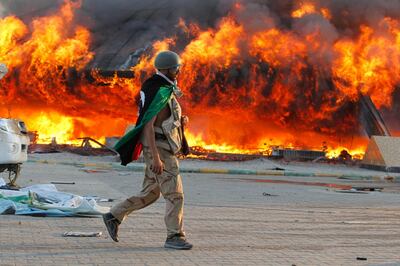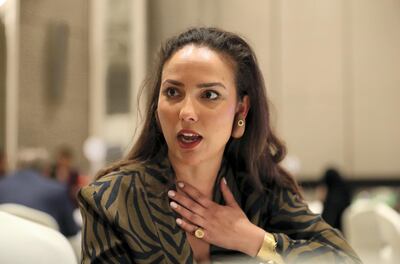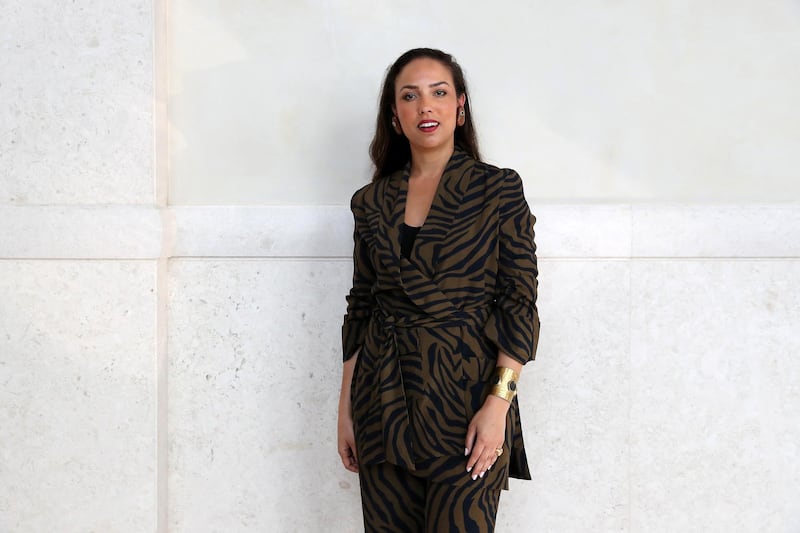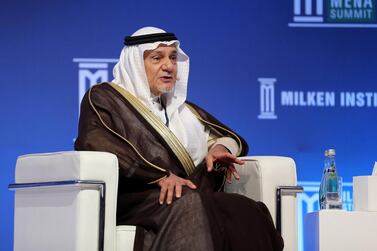A scion of the Libyan royal family ousted by Muammar Qaddafi has spoken about how the country is in a state of total flux, with airports and roads needing to be rebuilt if it is to emerge from its current crisis.
Princess Alia Al Senussi also spoke about her emotional homecoming to the country in 2011 after the fall of the dictator and how the hopes of a young generation of women desperate for change weighed on her.
Ms Al Senussi’s family ruled Libya until the military takeover of the country in 1969. Her grandfather, Abdullah Abed, was a senior prince, while her father, Prince Idris, was forced to leave when he was just 12.
“I knew there was no way Qaddafi could survive," she said. "It is impossible for evil to triumph in that way."
The royal’s comments came on the sidelines on the Milken Institute’s Mena summit in Abu Dhabi on Wednesday. Ms Al Senussi, 35, was moderating a panel on soft power and how culture can help countries prosper. She said arts and culture could help rebuild the country once basic structures are put in place.
Ms Al Senussi was born in America and now lives in London and she reflected on her emotional homecoming to Libya following the overthrow of Qaddafi’s brutal regime in 2011.

“It was really moving. There was a sense of hopefulness. I never knew I would have those emotions.”
She has returned to Libya several times, most recently in 2016, but saw the despair and a country paralysed by fighting and corruption.
Her hope for the future was also tempered by the weight of expectation from the younger generation, Libyans who could not get visas, travel abroad and had few chances in life.
“I grew up fully aware of who I was and my family legacy and I was very proud of that. In the Middle East I was much more aware of being a princess but it is different when you are not in your country.”
“When I got to Libya - that feeling,” she said with a hand placed over her heart.
"Their expectations of me: the hopes and dreams of young women who see me as one of their only international representations. You don’t see Libyans in the world – you just don’t. I really felt that. I don’t get very emotional in everyday life but that made me very emotional.”
Her father Prince Idris, an Italian citizen with a Libyan passport of royal vintage, has previously expressed willingness to play a part in government if asked to, though not in a political role.
Years after Qaddafi was overthrown, the situation in the country remains fraught. The UN-backed Government of National Accord has little control outside of Tripoli and is heavily reliant on the capital’s various militias for support. A rival administration in the east is backed by strongman Field Marshal Khalifa Haftar, the former Qaddafi officer turned defector, who has received support from the UAE, Egypt, Russia and France.
On Tuesday, Mr Haftar’s forces extended their control over eastern Libya after finally capturing the city of Derna. They apprehended as many as 40 militants who are alleged to be members of Al Qaeda in the process. They have also moved on Libya’s fractious south and this week took control of the country’s largest oilfield.
In the security vacuum that followed Qaddafi’s death, ISIS took over his former hometown of Sirte, until 2016, and attacked numerous high-profile targets such as the foreign ministry.

Ms Senussi, meanwhile, was moderating a talk featuring Noura Al Kaabi, Minister of Culture and Knowledge Development. Among other topics, it reflected on how arts and culture are central to people’s lives. She said Libya will rebuild and arts and culture will be a part of that. Libya has five World Heritage sites including Cyrene - one of the principal cities of ancient Greece and Rome.
But it is believed that many sites have been looted during the turmoil of recent years, with Unesco, the UN’s cultural body, warning auction houses to be wary of artefacts from there.
“The history of Libya is so incredibly rich and part of people's everyday lives. The ruins are in communities - not hours away. But it is not at a point yet where we can push a button – it is in a state of total flux. You can’t even enter Libya now.”
The princess is centrally involved with the arts. She is Art Basel’s representative in the UK and Middle East and is a member of the Tate Modern’s advisory council.
“Everyone is realising the role arts and culture plays in the world,” she said.
“Mohamed bin Zayed [Crown Prince of Abu Dhabi] understands that completely – we have the Louvre Abu Dhabi at our footsteps here. All of these things come together to make a happier society.”








